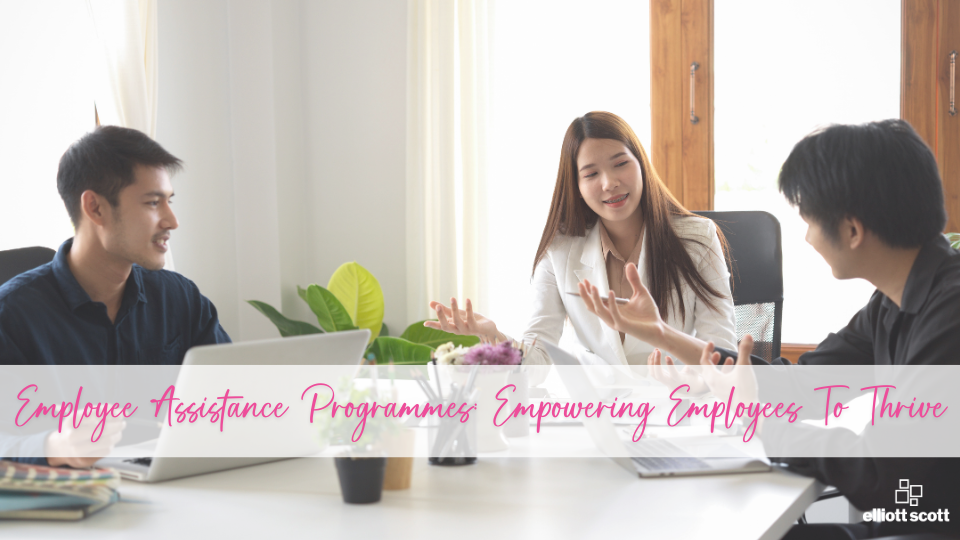Drop off your CV
We serve the global HR community through our offices located in Delhi, Hong Kong, London, New York, São Paulo and Singapore and have placed HR leaders in over 30 countries.
In today's fast-paced work environment, mental wellness programmes are more important than e...

In today's fast-paced work environment, mental wellness programmes are more important than ever. With employees dealing with mounting stress, it's crucial that HR take an active role in promoting their mental well-being. In Singapore, many organizations have implemented an Employee Assistance Programme (EAP) to help with staff wellbeing. Despite their rising popularity, many employees remain hesitant of utilising them. In this piece we will explore this and also why EAP’s are important and who they can benefit in your workforce:
Caregivers:
Caregivers carry a tremendous load. In Singapore's aging population, many employees face the challenge of balancing employment with elderly care. Strained with responsibilities, they juggle work and caregiving, knowing that the latter demands restless hours with almost no help. The stress of this role can take a significant toll on the mind. Not all managers understand the double duty, and therefore no support is offered. To fully perform at work, employees need to implement a healthy work/ life balance. Employee Assistance Programmes can be a useful resource for caregivers, offering counselling services, support groups, and other resources to help them manage their mental health and offer both themselves and their elders the support they need.
Toxic Leadership:
Workplace demands can create mental strain, especially with pressures from outside work like family obligations and the aforementioned caregiving duties. Combining this with a manager who demonstrates toxic workplace behaviours such as micromanaging, belittling and bullying towards their employees is an unfortunate reality many face. Poor leadership can have negative repercussions on an organization's performance. Some managers believe that driving employees to work harder through high levels of stress and pressure is the way to achieve better results. Rather than creating a culture of trust and accountability, managers who prioritize bottom lines often engage in toxic blame games and foster a culture of fear.
Considering employees spend a significant amount of their time working under their leaders, emotional instability and poor treatment can make for a hostile work environment. Healthy work environments should create a sense of psychological safety and trust, but lack of emotional intelligence and poor value for mental health can result in a toxic work culture. Organizations can take steps to address this issue by offering Employee Assistance Programmes that provide resources such as coaching and training sessions. By investing in leaders' emotional intelligence and wellbeing, organizations can create an environment of support and trust where everyone can thrive.
Why employees are hesitant to make use of their organizations EAP:
Stigma is a major barrier that prevents employees from seeking help for workplace mental health issues. Despite the growing acceptance regionally of mental health issues in the workplace, many employees still worry about what their colleagues and managers may think, and fear that their work capabilities will be questioned. In such situations, having an Employee Assistance Programme in place might not be enough. Organizations should seek to create a supportive and non-judgmental work culture that encourages employees to proactively prioritize their mental health.
For those who are hesitant about using an EAP, it’s important to remember that mental wellbeing is nothing to be ashamed of. Seeking help from a professional can provide the support and guidance needed to help you cope with difficult issues in your life. It’s also important for HR professionals to emphasize the importance of utilizing these resources and give employees the assurance that their privacy will be respected.
Overall, Employee Assistance Programmes are an invaluable resource for people dealing with stress or other mental health issues. By breaking down misconceptions and emphasizing its importance, more employees will feel comfortable taking advantage of them when needed. Having access to this type of assistance can have positive psychological outcomes which, in turn, benefits businesses by providing a healthier work environment for everyone involved.
If you would like to discuss the above, are looking for your next role or hiring into your HR function, you can get in touch with Adrina at adk@elliottscotthr.com